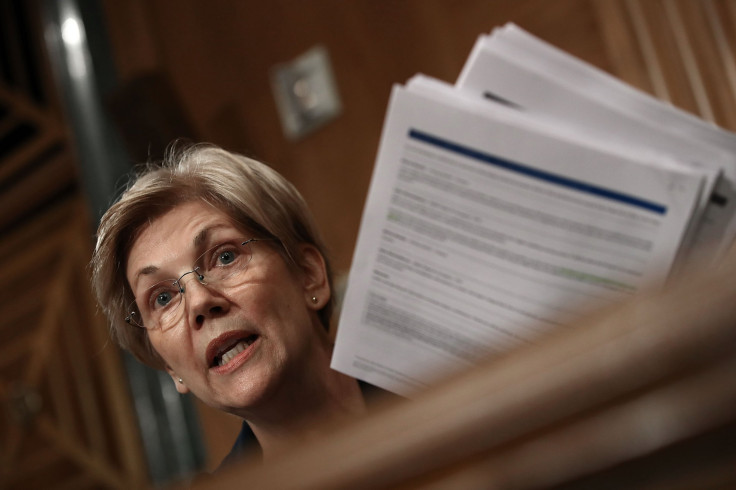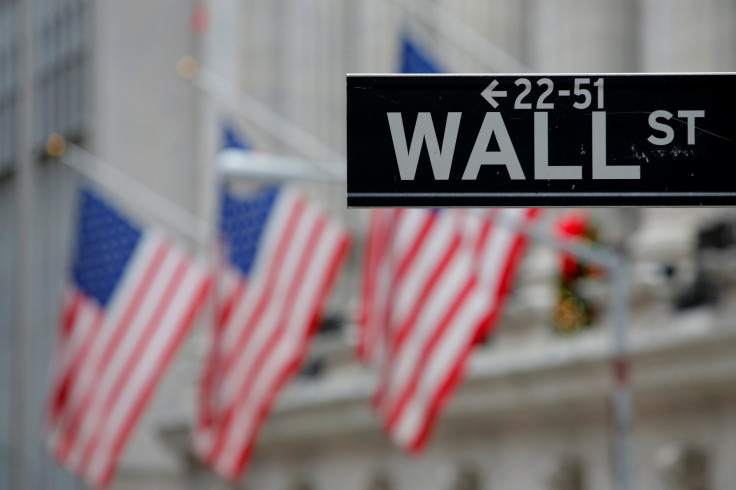Democratic Group Angers Progressives — Bets On Conservative Wing, Wall Street Money, To Win Back House

To the scorn of progressives, Democrats trying to win back the U.S. House next year are relying on the conservative wing of the party. The Democratic Congressional Campaign Committee (DCCC), the House’s primary campaign group, is coordinating with the Blue Dog Coalition, a group of 18 moderate Democrats that has shriveled in numbers and power in recent years, Bloomberg reported Monday.
The DCCC is tasking the self-described “fiscally responsible” Blue Dogs with recruiting candidates and helping these candidates with messaging and identifying consultants. The strategy comes after Democratic Party groups were lambasted by progressive politicians, activists and local party officials for failing to devote adequate resources to progressive candidates in some 2017 congressional special elections held in areas not traditionally competitive for the party, such as Montana and Kansas, and overemphasizing the race in Georgia, where moderate Democrat John Ossoff lost to conservative Republican Karen Handel amidst tens of millions of dollars in election spending.
The DCCC’s appeal to the center coincides with significant funding for the group from finance executives and other wealthy donors, many of whom bristle at the progressive wing of the party, especially Sen. Elizabeth Warren, who is known for advocating strict regulation of Wall Street. In fact, a leaked memo from the DCCC in 2016 revealed notes from meetings with representatives of Wall Street firms and other special interests, noting their concerns about an anti-finance mentality among the left.
The Blue Dog Coalition describes itself as representing “the center of the political spectrum” and “dedicated to pursuing fiscally-responsible policies, ensuring a strong national defense for our country, and transcending party lines to get things done for the American people.” The centrists may have a difficult time with elections and bipartisan legislation, as political polarization in the country continues to widen. Still, three out of the six Democrats who picked up House seats in 2016 ran as Blue Dogs.
By allying with the Blue Dogs, the DCCC is surely in for intense pushback from the left wing of the party. Bernie Sanders voters, Democratic Socialists of America, and other progressives are growing increasingly frustrated with what they see as a static, corporate Democratic machine that refuses to admit its 2016 faults and change its tactics. Conservative Democrats may have a difficult time winning their primary elections at a time when the left, which consists of several groups that may also field their own candidates to run in the Democratic primaries, is growing in size and influence.
“The days of the Blue Dogs are over,” Adam Green, co-founder of the Progressive Change Campaign Committee, a grassroots group dedicated to electoral and advocacy work on “economic populist priorities,” wrote in an email to International Business Times. “To win in red and purple districts, the party needs authentic local messengers who campaign on a bold, inspiring, economic populist message that challenges powerful interests on behalf of the little guy — not milquetoast candidates who are too cozy to Wall Street and special interests to connect with the concerns of working families.”
Finance Industry Executives Are DCCC Mega-Donors
The DCCC, which raised $49 million from January through May of this year, receives some of its funding from congress members’ campaigns and joint fundraising committees; for example, House Minority Leader Nancy Pelosi’s campaign and joint fundraising committee combined to give roughly $1 million to the DCCC in the first five months of 2017. But the majority of its funds come from individual donors, including large sums from hedge fund managers, real estate investors and other wealthy mega-donors whose business profits could suffer under progressive political leadership.
Among the biggest individual donors to the DCCC this year, all of whom gave more than $230,000 to the group, according to public data from the Federal Election Commission, are Donald Sussman, chairman of hedge fund Paloma Partners; George Marcus, chairman of commercial real estate investment firm Marcus & Millichap; and investor and oil heiress Anne Getty Earhart. Out of roughly 288,000 individual donations from January through May of this year, 637 came from self-identified CEOs, and 81 were from individuals who listed themselves as “chair” or “chairman” of a company.
Hedge fund chairman Sussman, a former bank director who also chairs Essex Property Trust and another entity based in an offshore tax haven, is a familiar name among Democratic mega-donors. He poured nearly $42 million into politics in 2016, including $21 million to the pro-Hillary Clinton super PAC Priorities USA, making him the third-largest individual political donor of that election cycle. He has already given the maximum allowed amount, roughly $237,000, to the DCCC—including about $102,000 for “building fund/headquarters” that is now permitted due to a provision in a bipartisan 2015 federal budget bill signed by then-President Barack Obama.
The billionaire real estate investor Marcus, who has also given the $237,000 maximum to the DNC, and his wife Judith combined to donate $3.4 million to federal politics during the last election cycle, all of it benefiting Democrats, including $1.3 million to the House Majority PAC and another $1 million to the Senate Majority PAC.
Earhart, who has also given the DCCC $237,000 in 2017, is the granddaughter of the late Jean Paul Getty, who made a fortune from oil extraction investments and was once the richest person in the United States. She has used her wealth for environmental philanthropy and copious donations towards mainstream Democrats, committees aiding the party such as Priorities USA and the Obama-aligned Organizing for Action, and to establishment think tanks such as the Center for American Progress, which is led by close Clinton ally Neera Tanden.
The many other donors in the financial industry giving tens or hundreds of thousands of dollars to the DCCC this year include William Derrough, managing partner at investment bank Moelis & Company; John Freidenrich, chairman at investment firm Regis Management; James Hormel, chairman of investment manager Equidex; Ahmad Khawaja, CEO of e-commerce merchant Allied Wallet; Seth Klarman, CEO of hedge fund Baupost Group; Dinakar Singh, CEO of hedge fund TPG-Axon Capital; and Daniel Neidich, CEO of Dune Real Estate Partners and former chairman and co-CEO of Dune Capital Management, the now-defunct hedge fund of which Treasury Secretary Steve Mnuchin was also co-CEO.
Financial industry PACs donating to the DCCC in 2017 include the Wells Fargo PAC, the Managed Funds Association PAC and the Goldman Sachs PAC. The DCCC did not quickly respond to a request for comment.
Financial Firms Cringe At Anti-Wall Street Messaging
In October 2016, The Intercept reported on a hacked fundraising document with notes from meetings between DCCC chair Rep. Ben Ray Luján of New Mexico and special-interest groups, unions and corporations including the Securities Industry and Financial Markets Association (SIFMA), Goldman Sachs, and General Electric. Andy Blocker, executive vice president of public policy and advocacy at SIFMA, which represents major financial firms, told the DCCC that “Blue Dogs, New Dems and Progressives” needed to get “on the same page.” Blocker and Joseph Vaughan, managing director of federal government relations for SIFMA, were reportedly “upset around messaging demonizing Wall Street” and expressed some relief after being told that Pelosi had said, “Warren doesn’t speak for the party.” They preferred Clinton’s “messaging around ‘bad actors,’ which is more palatable and crosses industries.”
“SIFMA cannot support the DCCC right now, in large part due to messaging,” reads the document. It also says that SIFMA was concerned about a fiduciary rule from the Department of Labor regulating financial advisers. The group’s political action committee, which is funded by employees of firms such as Goldman Sachs, Ameriprise Financial and J.P. Morgan Chase, has not donated to the DCCC so far this year, nor did it do so during the 2016 election cycle. In 2014, however, it gave the DCCC $30,000. So far in 2017, the PAC has given $5,000 each to the PACs of the New Democrat Coalition —a group of congressional Democrats who are “pro-growth” and “fiscally responsible”—and the Moderate Democrats PAC as well as other amounts to the individual campaigns of both Republicans and Democrats. SIFMA did not respond quickly to a request for comment.

Joyce Brayboy, a Goldman Sachs lobbyist and a member of the Democratic National Committee who helped elect establishment-aligned Tom Perez as DNC chair over progressive Keith Ellison, and Michael Pease, co-head of global government affairs at Goldman Sachs, met with the DCCC to convey similar concerns. They “feel like the rhetoric [around Wall Street] is problematic,” the document states. Goldman employees who support Democrats felt that they were being attacked, and Brayboy and Pease said “there isn’t enough rhetoric coming from Pro-Business Democrats” and they “don’t like Warren’s messaging.” They wanted to engage with the DCCC on income inequality but said “it should be about lifting folks up, not tearing others down.”
The Goldman Sachs PAC has already donated $15,000 to the DCCC this year, and during the 2016 election cycle it gave $30,000.
In the DCCC’s meeting with General Electric lobbyists and the head of the company’s PAC, which gave the group $30,000 in 2016, the corporate giant made suggestions for strategies to help elect for Southern and pro-business Democrats. GE’s PAC has given $15,000 to the DCCC this year.
The DCCC notes also document meetings with unions and progressive groups including the Service Employees International Union and Planned Parenthood.
© Copyright IBTimes 2024. All rights reserved.





















